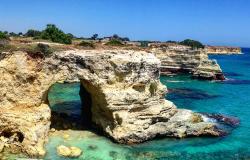 Italy's forest fire emergency claimed the lives of four people in the southern region of Puglia on Tuesday.
Italy's forest fire emergency claimed the lives of four people in the southern region of Puglia on Tuesday.
Police said two unidentified people were found burnt to death in their car near the coastal resort of Peschici on the Gargano peninsula on Tuesday afternoon.
Another two people were later found dead from smoke inhalation on a beach near Peschici.
The deaths took the overall toll to five after a Canadair pilot died on Monday evening when his firefighting plane crashed into a mountain in parkland in Abruzzo.
Interior Minister Giuliano Amato called for the "planned and coordinated use of all resources available" to fight the blazes that have been sweeping through central and southern Italy while Defence Minister Arturo Parisi said troops would be sent in to help.
Thousands of people were evacuated from fire-threatened buildings and camping sites on Tuesday.
One of the worst-hit areas was the Gargano, where more than 1,000 people were trapped on beaches near Peschici and Vieste after fires spread across adjacent woodland.
The coastguard and navy ships were taking part in the rescue operations in a situation described as "critical" by the local authorities.
Another 250 people had to be evacuated from homes, resorts and camp sites in and around Peschici.
In the neighbouring town of Vieste, schools were reopened to shelter tourists fleeing seaside hotels and camping grounds.
Witnesses reported scenes of panic as flames ripped through four Vieste camp sites.
Some of the tourists needed treatment for smoke inhalation.
All camping sites in the area were subsequently shut down as a precaution.
The fires were being fanned by strong winds, which made it impossible for helicopters to take part in firefighting operations.
Higher up the coastline in the Molise region, people were evacuated from near Termoli and concern was growing that the flames would reach homes on the southern outskirts of the seaside town.
The head of Molise's regional government, Michele Iorio, asked for a state of emergency to be declared.
Some rail services between Rome and the east coast were also disrupted by the fires.
In Calabria, where temperatures soared above 40 degrees Celsius, the authorities were fighting ten major fires and dozens of smaller ones with the help of two Canadairs and a helicopter.
In the town of Magisano near Catanzaro, inhabitants took refuge in the local church to escape the dense smoke of a nearby fire.
More than 250 people were evacuated in Ortona dei Marsi in Abruzzo as a precaution, while in the lakeside town of Castel Gandolfo near Rome where the pope has his summer residence, two hotels and 25 villas had to be evacuated and two homes suffered fire damage.
Firefighters were also tackling scores of blazes in the region of Campania around Naples, as well as on the islands of Sardinia and Sicily.
In Sardinia, a firefighters said 30,000 hectares of woodland had been destroyed.
Italian farmers' association CIA said the fires had already caused five billion euros of damage nationwide.
ARSONISTS BLAMED.
The civil defence department said Italy was dealing with one of the worst fire emergencies in years and laid the blame on arsonists whom it said were "waging war" on the authorities.
Civil Protection chief Guido Bertolaso said that "all the forces of law and order stand united in response to this war waged by irresponsible criminals... The arsonists will not prevail".
Bertolaso said the State had already paid a "high and tragic price", referring to the death of Canadair pilot Andrea Golfera, 51.
Investigators said the Canadair was climbing steeply in thick smoke when the pilot lost control and his plane hit the tree-covered mountainside.
Golfera's co-pilot, 28-year-old Daniele Ret, is in hospital in a drug-induced coma but doctors said his condition was not life-threatening.
Bertolaso said that "the real responsibility for Golfera's death lies with the people who start these fires".
Forestry Corps Chief Cesare Patrone agreed that nearly all of the blazes had been started deliberately.
"These environmental disasters are generally the result of criminal actions motivated either directly or indirectly by economic interests. Not only do they seriously damage our natural heritage but they also cost human lives," he said.
Suspicion usually focuses on farmers seeking to clear space for agricultural purposes or by construction speculators hoping to win permits to build on protected land.
It is also sometimes claimed that firefighters themselves and members of the Forestry Corps set fire to woods in the hope of creating new jobs, either battling the flames or working in reforestation programs.
Bertolaso, meanwhile, warned that Italy's current heat wave and drought, key factors in the fire emergency, would continue.


